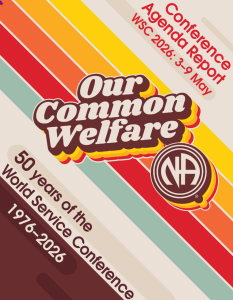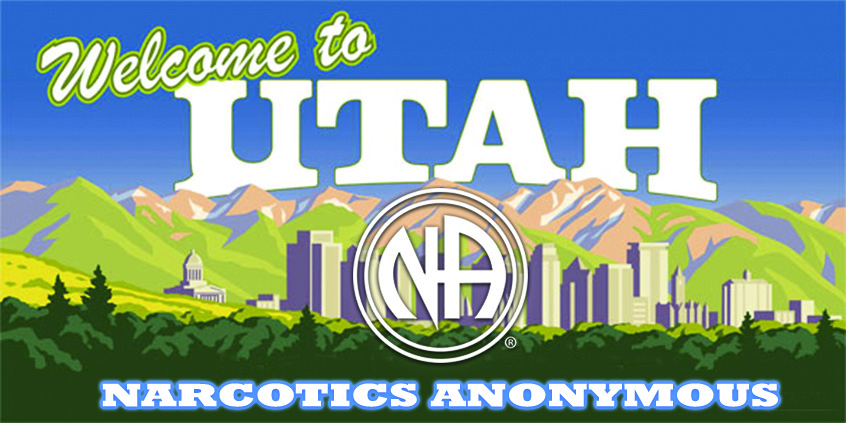World Service Conference 2026
[May 3 – 9, 2026]

Download, Learn, & Vote
The Conference Agenda Report (CAR) is available for download.
Each Motion is listed further down this page with their Intent and Rationalization from NAWS.
Votes are counted by Group (rather than by Area) for the RD & RDA to carry a group conscious from the groups in the Utah Region to WSC. Voting can be done with the online survey that can be filled out at a group’s business meeting.
DOWNLOAD
2026 CAR
This cycle the Conference Agenda Report (CAR) includes 5 CAR motions to be voted on at the 2026 World Service Conference (WSC). This full report is 87 pages (including 5 addendums).
DOWNLOAD
2026 CAT
This cycle the Conference Agenda Track (CAT) includes 16 CAT motions (motions 6-21) to be voted on at the 2026 World Service Conference (WSC). This full report is 77 pages.
View/Download the PowerPoint Slides
LEARN
Read About Each CAR Motion
In the section below, you can read the five CAR motions including each motion’s intent and rationale.
LEARN
Presentation with Region Delegates
The RD and RDA will be holding an in-person meeting on February 22nd at 1pm to go over the motions in BOTH the CAR and CAT and answer any questions as well as discuss the motions with the Region for a group concious beyond merely vote counts.
2026 CAR/CAT Presentation:
![]()
Sunday, January 19th @ 1pm
VOTE
Online Survey for Group Voting
Online Survey for each group in the Utah Region to fill out in order to get their group’s votes to the Regional Delegates.
CAR Workshop Materials
2026 CAR Video 1 of 6:
Introduction to the CAR
2026 CAR Video 2 of 6:
Motions
2026 CAR Video 4 of 6:
DRT/MAT in NA–Helping Members Take Root
2026 CAR Video 5 of 6:
Literature, Service Material, and IDT Survey
CAR Motions (Summarized)
Motion 1
Approve the revised IP #21, Staying Clean in Isolation, contained in Addendum A, as Fellowship approved recovery literature to replace the current IP #21, The Loner—Staying Clean in Isolation.
More info:
Intent: To update this IP originally approved in 1986 with current Fellowship experience.
Financial Impact: None at this time.
Policy Affected: None
For More: See Addendum A “IP #21, Staying Clean in Isolation” on page 58 of the CAR.
Motion 2
To adopt the collaboratively created 2026–2029 NA World Services Strategic Plan contained in Addendum B.
More info:
Intent: To approve the results of the collaborative planning that began at WSC 2023 and continued with zonal and conference participant involvement throughout this cycle.
Financial Impact: No direct financial impact. Any future expenses will be called out in project plans or budgets.
Policy Affected: None.
For More: See Addendum B “NA World Services Strategic Plan” on page 64 of the CAR.
Motion 3
To hold the World Convention of Narcotics Anonymous (WCNA) every 5 years, beginning in 2028. The location to be determined by the World Board based on fiscal and geographic considerations that lend themselves to, at minimum, a revenue-neutral event. (The specific changes to the WCNA Guidelines in GWSNA are shown in Addendum C.)
More info:
Intent: To have guidelines for the World Convention (WCNA) that reflect the changing nature of large
events worldwide and support the prudent use of Fellowship resources.
Financial Impact: No direct financial impact. Any future expenses will be called out in project plans
or budgets.
Policy Affected: The policy offered in Addendum C will replace the current WCNA guidelines in
GWSNA (pages 46–48) shown in Addendum D.
For More: See Addendum C, “Proposed World Convention Guidelines…” in the CAR.
Motion 4 (Regional Motion)
To direct the World Board to create a project plan for consideration at WSC 2029 to research and explore the opportunities and obstacles of providing booklength pieces of literature to the incarcerated, on tablets, in addition to the IPs and audio version of the Fifth Edition Basic Text that already exist on inmate tablets.
More info:
Maker: Arizona Region
Co-makers: Florida, Ohio, Northern California, Southern California, Sweden, UK, Utah
Intent: To give the Conference and Fellowship the ability to meaningfully discuss the opportunities and obstacles of making booklength pieces of literature available to the incarcerated on tablets.
Rationale by Region: Narcotics Anonymous exists to carry a message of hope and freedom to every addict seeking recovery, including our members behind the walls. As correctional systems increasingly transition from physical books to secure digital tablets, many incarcerated addicts are being cut off from booklength NA literature such as Just for Today, It Works: How and Why, and Living Clean. Without action, this shift threatens to limit access to the foundation of our message for some of our most isolated members.
Approving this motion would allow the World Board to develop a project plan exploring practical, principled ways to make our Fellowship’s booklength literature available through prison tablet systems. This plan would examine logistical, legal, financial, and Fellowship-related issues, ensuring that any approach upholds the principles of self-support and preserves the integrity of NA’s intellectual property, as outlined in the Fellowship Intellectual Property Trust (FIPT ).
Many incarcerated members already face disparities in literature access, depending on facility policies and geography. Exploring digital options would help the Fellowship respond to these inequities while adapting to a changing environment. It also presents an opportunity to strengthen our trusted servant relationships with correctional institutions, ensuring that NA literature remains accessible to those with limited financial resources.
By supporting this motion, the World Service Conference would affirm our commitment to carrying the message to all addicts, regardless of circumstance, and empower the World Board to be proactive, bringing back informed options for Fellowship review and approval.
Financial Impact: There is minimal cost in creating a project plan. The cost to NAWS would be in the project itself if the WSC were to adopt and prioritize the plan.
Policy Affected: None
World Board Response: The World Board shares the maker’s commitment to ensuring that all addicts—including those who are incarcerated—have access to NA literature and the message of recovery. We recognize the shift from printed books to digital tablets in correctional systems offers both opportunities and challenges.
We believe this motion is unnecessary, as NA World Services is already engaged in ongoing efforts to make literature accessible in correctional facilities while upholding self-support and the integrity of the Fellowship Intellectual Property Trust (FIPT). We currently work with vendors and departments to provide, at no cost, materials already available on na.org. The Basic Text is available in twelve languages in audio, and IPs, booklets, and translated materials are accessible in 61 languages. An Introductory Guide to NA—with ten IPs and the Steps chapter from the Basic Text—is soon to be available in English and Spanish audio.
Providing full-length books on tablets is not a simple solution. Correctional environments vary widely; many still require physical books. We do not contract with for-profit tablet companies that would charge for materials we provide for free. Our focus remains on accessibility, not commercialization.
It is important to recognize that NA World Services remains largely funded through literature sales, a considerable amount of which comes from initiatives to help incarcerated addicts. We make many resources freely available because we believe deeply in our mission; we must also ensure the sustainability of the services that allow us to carry that message worldwide.
We once offered PDFs of major titles online, but massive unauthorized distribution forced their removal. Audio materials, especially in Spanish, are now the most frequently accessed resources on inmate tablets. This has guided our recent recording projects.
As has been our practice for more than two decades, NAWS continues to provide free literature to incarcerated members upon request and offers a Basic Text after continued contact. We also recognize the importance of H&I efforts to carry meetings into facilities as well as reentry support, including helping members who receive addiction medication, to feel welcome in NA.
While digital tools will continue to evolve, our balanced approach—combining technology, human connection, and financial responsibility—remains the most effective way to carry our message. The motion’s intent aligns with work already in progress at NA World Services.
Motion 5
To direct the World Board, to implement artificial intelligence (AI) interpretation solutions for WSC meetings (both in-person and virtual) to replace the current human live language interpretation.
More info:
Maker: South Florida Region
Co-makers: Iran, UK, Nepal
Intent: To eliminate language barriers, ensuring that all voices are heard globally, enhancing our communication and time efficiency during business meetings. This initiative also aims to reduce the risk of human interpretation errors and potential absences during our sessions.
Rationale by Region: We would like to provide further clarification regarding the intent of this initiative. Our objective is to empower RDs and ADs whose primary language is not English, enabling them to articulate their perspectives more effectively in their native language during direct discussions. This will reduce the reliance on interpreters. Additionally, this approach aligns with our second concept: the service structure will seek guidance and resources from the groups, including spiritual guidance, which we regard as a matter of conscience in this context.
Financial Impact: The financial impact of implementing this technology is expected to be significant but has not yet been determined pending further analysis.
Policy Affected: None
World Board Response: World Services shares the goal of improving communication and participation at the World Service Conference (WSC), especially for members whose first language is not English. Removing barriers to participation is something we deeply value.
However, this motion would limit the conference’s ability to adapt and make timely operational decisions. We support experimenting with new technologies to enhance accessibility and efficiency, but this motion mandates a specific tool—AI interpretation—to replace human interpreters. That replacement is the concern. Human interpreters, nearly always NA members, bring accuracy, cultural understanding, and a spiritual connection that technology cannot replicate. Replacing them would undermine effective communication at the WSC.
We’ve long held that WSC participants themselves are best positioned to test and decide on process changes, as noted in our 2023 CAR response: “Allowing participants to make decisions about the processes that affect the WSC meeting is significantly more nimble than making these types of
changes through the CAR.” Given how quickly technology evolves, flexibility is more practical than
a rigid policy.
AI tools could be explored as supplements—not replacements—in smaller settings or between conferences, but mandating them now, without trials or research, is premature. WSC interpreters do far more than translate—they convey recovery concepts, emotional tones, and cultural nuances vital to understanding. They also help participants between sessions, ensuring two-way communication that AI cannot yet provide.
Conference discussions sometimes include sensitive matters. AI-based systems pose potential privacy risks and lack the understanding of NA’s Traditions that human interpreters bring. Current technology also struggles with accuracy, speed, and context—especially with our specialized recovery language.
The World Board supports continued exploration of new tools to aid communication, but not as mandated substitutes for human interpreters. The WSC’s success depends on flexibility, inclusivity, and spiritual connection—not automation. We encourage ongoing experimentation and dialogue at the conference level as technology continues to evolve
More Information
NAWS Conference Website
Find more info and resources
